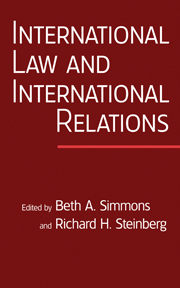Book contents
- Frontmatter
- Contents
- Contributors
- Abstracts
- Preface
- Editors' Note
- PART I INTERNATIONAL REGIMES THEORY: DOES LAW MATTER?
- PART II COMMITMENT AND COMPLIANCE
- 3 Democratic States and Commitment in International Relations (1996)
- 4 On Compliance (1993)
- 5 Is the Good News About Compliance Good News About Cooperation? (1996)
- PART III LEGALIZATION AND ITS LIMITS
- PART IV INTERNATIONAL LAW AND INTERNATIONAL NORMS
- PART V TREATY DESIGN AND DYNAMICS
- PART VI LAW AND LEGAL INSTITUTIONS
- PART VII OTHER SUBSTANTIVE AREAS OF INTERNATIONAL LAW
- References
- Index
4 - On Compliance (1993)
Published online by Cambridge University Press: 05 June 2012
- Frontmatter
- Contents
- Contributors
- Abstracts
- Preface
- Editors' Note
- PART I INTERNATIONAL REGIMES THEORY: DOES LAW MATTER?
- PART II COMMITMENT AND COMPLIANCE
- 3 Democratic States and Commitment in International Relations (1996)
- 4 On Compliance (1993)
- 5 Is the Good News About Compliance Good News About Cooperation? (1996)
- PART III LEGALIZATION AND ITS LIMITS
- PART IV INTERNATIONAL LAW AND INTERNATIONAL NORMS
- PART V TREATY DESIGN AND DYNAMICS
- PART VI LAW AND LEGAL INSTITUTIONS
- PART VII OTHER SUBSTANTIVE AREAS OF INTERNATIONAL LAW
- References
- Index
Summary
In an increasingly complex and interdependent world, negotiation, adoption, and implementation of international agreements is a major component of the foreign policy activity of every state. International agreements come in a variety of shapes and sizes formal and informal, bilateral and multiparty, universal and regional. Our concern is with contemporary agreements of relatively high political salience in fields such as security, economics, and environment, where the treaty is a central structural element in a broader international regulatory regime. Some of these agreements are little more than statements of general principle, while others contain detailed prescriptions for a defined field of interaction. Still others may be umbrella agreements for consensus building in preparation for more specific regulation. Most of the agreements of concern are [now] multilateral.
We believe that when nations enter into an international agreement of this kind, they alter their behavior, their relationships, and their expectations of one another over time in accordance with its terms. That is, they will to some extent comply with the undertakings they have made. How or why this should be so is the subject of a burgeoning literature and debate in which, for the first time in half a century, the possibility of fruitful dialogue between international lawyers and students of international relations has emerged. This article explores some basic propositions we think should frame this discussion.
- Type
- Chapter
- Information
- International Law and International RelationsAn International Organization Reader, pp. 65 - 91Publisher: Cambridge University PressPrint publication year: 2007

